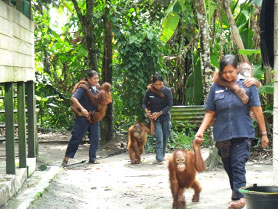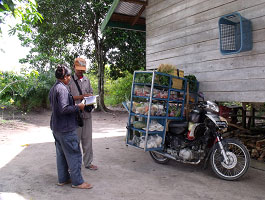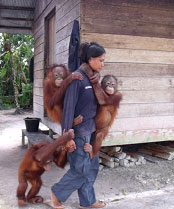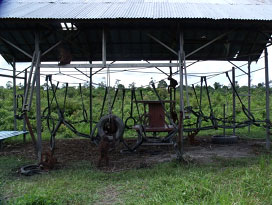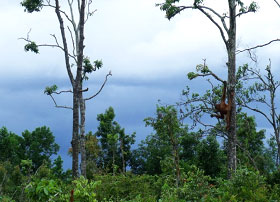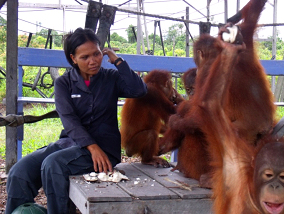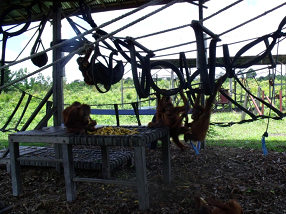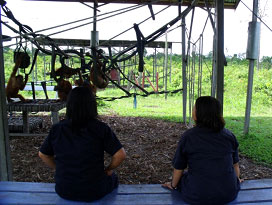Tags:
Facility Playpen QuarantineThe orangutans at OFI’s Playpen Facility are about to finish their banana breakfast when I arrive around 8:30 in the morning. Today, I’m spending my day at this facility within OFI’s Orangutan Care Center and Quarantine to meet the orangutans and their caregivers, and to experience what it’s like to work here.
For the caregivers, the day starts before 8:00 am when they begin feeding the orangutans breakfast. Now that the orangutans are busy eating, the caregivers are doing some grocery shopping at the “supermarket on wheels” which is just passing by. When I ask one of the caregivers about what she is eating, it turns out to be Indonesian ice cream. I admit to never having tried it and so one of the caregivers buys ice cream for all the humans at the facility. It is typical Indonesian hospitality and a good start of the day.
When we’ve finished our ice cream and the orangutans have finished their breakfast, they are released from their night enclosures and brought to the playground behind the facility. This facility is home to orangutans aged three to five years – as such, it is somewhat equivalent to preschool. In order to ensure that these young orangutans get exercise and play time but are always well supervised, they spend their days outside at a huge playground full of enrichment items and activities. As the orangutans arrive at the playground in the morning, they immediately climb up the various swings, ropes, and tires that are suspended throughout the playground. Each caregiver makes a couple trips back and forth from the night enclosures to the playground, each time taking one or two orangutans with her (or him as there is one male caregiver at that facility).
It seems that the orangutans at this facility can be divided into three categories: adventurous, naughty, and nice. Of course, the last group is by far the smallest and so a day at the playground proves to be hard work. While the naughty orangutans are always playfully charging the caregivers and softly nipping and pulling hair, the adventurous orangutans are escaping the playground and disappearing into the surrounding trees. For the caregivers, this means alternatively peeling naughty orangutans off of themselves and each other, and heading off into the surrounding secondary forest to bring back the wandering explorers. Other orangutans sneak back to the main facility, near their night enclosures, as they know that there is food to be found around the kitchen and storage rooms. In short, the life of a caregiver at the playpen facility is busy and hectic.
Despite the sometimes stressful moments at the playground, the women working here are some of the most caring, loving, and funny people that I’ve ever met. No matter how naughty an orangutan is, they deal with him/her in a gentle and calm way. Instead of using force to make a naughty orangutan back off, the women here start calling loudly, dancing vigorously, making scary faces and moving their hands in growling motions. If things get really out of hand, they will take a piece of wood and bang it against the building’s framework, making a loud drumming sound.
This unique way of handling orangutans is working out well for them. Especially when this ritual is performed by everyone at the same time to scare a larger infant orangutan, it is simply a hilarious but wonderful sight to see! Some of the five year old infants (who are almost small juveniles) weigh close to 30 pounds or more, so it is obvious why the caregivers don’t want to be nipped.
The orangutans are kept in the playground as long as possible each day, and are only brought back to their night enclosures at the end of the working day. Around noon there is additional feeding, usually in the form of fruits such as bananas or oranges. This gets the orangutans really excited despite the fair amount of young leaves and forest fruits that are continuously available to them. Around one o’clock there is water and milk for drinking and after the orangutans get back to their night enclosures, there is dinner before sleep. It is the same schedule every day, but that’s good because young orangutans, just like young children, need consistency, routine, and dependability. Also, this daily routine ensures plenty of exciting time outside for our young red ape friends!
